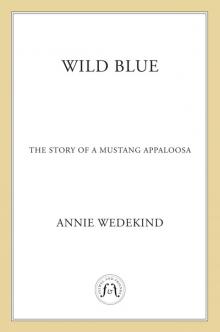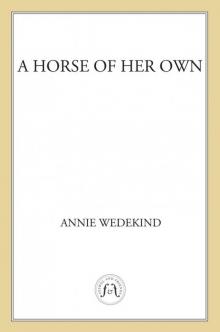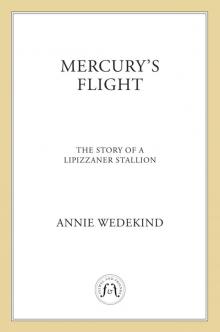- Home
- Annie Wedekind
Samirah's Ride Page 3
Samirah's Ride Read online
Page 3
Magpie and Sunny were also herd leaders, so they were smart about equine communication, as was Dodger, who seemed to know exactly how much he could get away with. Some horses are deaf to the workings of a herd, and tend to make themselves unpopular and miserable as a result. I am thinking in particular of Zelda, a brown-and-white-patterned Appaloosa who was always uneasy about her place in the herd. She challenged Magpie for precedence, bullied the other mares, and generally made herself disagreeable. She didn’t know where she belonged—she had been the second-ranked mare at the herd she lived in before Red brought her to the ranch—and she did her best to make the rest of us feel just as uncomfortable. Luckily, her best wasn’t very much, and she was no match for Magpie. The only horse who really tolerated Zelda well was Chief, but then he wasn’t known for his particularity. Chief, I’d discovered, was not terribly bright, but he did have a remarkable ability to form friendships, and he was utterly reliable.
Of course even a clever horse can have her wits dulled by a dull human, especially if the horse is sensitive. Rough handling, inconsistency, unnecessary correction: too-common human traits that first confuse, then frighten, then alienate a horse. Not every filly is lucky enough to belong to a human with the wisdom of Solomon (or, for that matter, to belong to King Solomon himself, like several of my ancestors who were imported from Egypt for his stables).
But I digress from my original point, which was about the games and how they factored into my early training. You might think that a nine-year-old girl is too young to be responsible for any serious horse training, but Jasper was her father’s daughter, and her father taught her well. In between her chores (more onerous in the spring and summer months) and school (which took up quite a bit of her time in autumn and winter), Red trained Jasper to train me.
I was already accustomed to being handled and groomed and led. Soon I learned to walk in circles around Red, then Jasper, from a long lead they called a lunge line. From walking, halting, and changing directions, I progressed to trotting and cantering, having to pay close attention to when they wanted me to quicken or slow my pace, or to stop altogether. It required focus, and it made me a little dizzy, especially cantering (I’m quite fast). But soon Jasper found a way to make it fun.
The paddock became a racetrack, the sands of the Sahara, and a rodeo stadium, among other incarnations. I would be introduced in ringing tones as “Samirah! Amazing Arabian of the West!” Before our lessons, Jasper would braid wildflowers in my mane, tail, and forelock, as Bedouins decorated the forelocks of my ancestors, and the repetition of this ritual thrilled me to the core. Peach joked that I turned into a princess when Jasper adorned me, far too proud and high-spirited for my own good. But for me, the flowers and ribbons were more than mere decoration—they crowned me, they honored the legend of my tribe, that fortune and happiness were bound up in, of all things, my very forelock. Princess? I rather think queen is more appropriate. Jasper’s delight in my quickened gait, the proud arch of my neck, the high carriage of my tail, inspired me even more than the flowers. Oh, the riches of friendship! Jasper’s love for me came in gifts of flowers, her love for my beauty made me want to be more beautiful still, and my response to her happiness made her, if possible, happier still. I was well on my way to trusting her, to wanting to do everything for her, as Sunny and Magpie did for the rest of her family. I was learning, and sometimes the lessons seemed incomprehensible, but never the lesson of love. That was written in Jasper’s eyes, and in mine.
. . .
“Ridiculous,” Zelda snorted as I trotted over to the water trough. Jasper had just turned me out in the big pasture after our morning lesson, in which I’d perfected backing at Jasper’s voice command. But I hadn’t backed as Sami, Cold Creek Ranch horse. I’d backed as Sami, famed mount of a Native American scout (Jasper), who was training her horse to move silently and deftly through the sagebrush and nettles (never mind that the corral’s footing was firmly packed dirt). Being an Indian pony, I had a bold white circle painted over my left eye and zigzagged stripes like streaks of lightning down my forelegs. I felt very fierce and brave.
I tossed my head and headed for the water trough. After bullying Julep one too many times, Zelda had recently been demoted (again) to lowest mare on the herd totem pole. This meant that I was promoted, however temporarily, and the Appaloosa was anything but pleased. I didn’t have a great deal of sympathy for her—she made that difficult—but it did occur to me, as I put my head down and drank, that it might be lonely not being somebody’s horse. Chief had Peach, Magpie had Red, Buck had Miz M, Julep had Bull, and Sunny sort of belonged to the entire family, but the rest of the horses were there for the guests, and when there weren’t guests, they were rather at loose ends. It gave them more time to squabble for precedence and fret about little things like dinner not being exactly on time or having to be clipped. And maybe even Dodger would be less naughty if he had a young person to be his companion. Well, maybe.
At least the Artful Dodger was cheerful with his infractions. Zelda was just plain cranky, and Cricket moped a lot. Only Irish seemed thoroughly at peace with her haphazard riding schedule and periods of inactivity. As I raised my dripping muzzle and gave a little snort of satisfaction, I caught sight of the elegant bay, quietly staring out over the hills. I decided to see if she’d like to swish flies with me. I’d only done this with Chief and Dodger so far, but my promotion to second-lowest mare, and perhaps my Indian pony paint, gave me the courage to approach her.
I walked slowly up the grassy slope, giving Irish time to warn me away or to retreat if she was so inclined. But the mare didn’t even seem to notice me until I was almost to her flank, and then she turned with startled eyes. I blew out what I hoped was a reassuring breath and nickered. Her expression softened and she sighed. I took this for encouragement and angled my body toward hers so my tail could reach her right shoulder. A moment later, she eased a step closer to me and I felt the flick of her tail near my withers. How nice, I thought.
She must have felt the same, because we stayed that way for quite a while, gazing out in opposite directions of the same green view. It was late summer and the birds were busy harvesting the serviceberry fruit. Buck could probably already scent the first hint of autumn on the warm breeze, but to me the ranch seemed garlanded with life. Perhaps this was the secret to Irish’s peace, the richness of these hills, this place. Perhaps she had lived in a different sort of world before. My mother had told me that some horses did not have the luxury of space to roam, fields to graze. I couldn’t imagine it, but something told me that Irish could—and had.
. . .
Chief was pleased that I’d made friends with Irish, and under his protective guidance, I soon was on good terms with the entire herd, excepting Zelda. Magpie still held herself aloof, but I felt I understood her better now, having watched her with Red. She considered herself his partner, and while she took her responsibilities with the herd seriously, I could tell that she felt that her true place was under Red’s saddle. She seemed always to be waiting for his whistle, for the sound of his hand at the gate. Of course, I was getting to be the same way about Jasper.
When autumn came, the golden birch leaves dappled the creek like coins of sunlight and the sumac caught fire in hues that rivaled my coat. I liked to look at Jasper’s tangled braid resting against my shoulder, to see the russet hair next to my own coppery shade, then to look up to the transformed trees, molten orange and apple red. Autumn suited us beautifully.
“You two under the maple tree make my eyes hurt!” Miz M laughingly complained. We were indeed the next brightest creatures to the flaming branches. True, my long mane and tail are black, as is my muzzle and the area around my eyes where the midnight skin of the Arabian is revealed, but it’s a deep black that contains fire and velvet and the gleam of embers.
“I am Vulcan, god of Fire!” Jasper called back. “And this is my celestial steed!” I liked the sound of that.
“Does the celestial steed know that
Vulcan needs to come inside and finish her homework?”
“Gods don’t have homework!”
Unfortunately, Vulcan seemed to be the exception. That night, I looked up to Jasper’s window, which faced the pasture, and watched her silhouette against the room’s yellow glow. For a while, she appeared to be sitting very still, concentrating, her forehead resting on one hand. Then she shook herself, stood, and stretched out her arms.
“Vulcan has finished her homework!” she shouted out the window, and I could hear her mother’s laughter from the kitchen window below. Jasper might want to be a rebel, but she was a very responsible one.
She reminded me so much of a filly. Her instincts and her duties intertwined, often tugging at each other. I must admit that sometimes when Jasper led me to the corral for training, even though I really did want to please her, and mostly enjoyed the work, part of me was also tempted to try to break free, to break for the mountains to see what they held, to goad Dodger into a game of chase, to hide down by the creek and be a very naughty, but free, filly. How many horses are lucky enough to have a companion who can sense this? Who can see the wild, untrained heart straining within the civilized form? I am fortunate to be one of them. On my untamed days, Jasper led me back out of the corral (oh, how my hooves danced when that gate closed behind us!) and took me for a walk instead.
Looking back, I realize that these walks were quite as educational as my groundwork, but it was the sort of learning that sinks in gently, through the skin rather than through the head. I was taught to follow Jasper through the creek and over the metal cattle guard that fronted the entrance to the ranch, though the clatter of my hooves over the strange, slippery surface made me shiver. I learned about the hazards of holes and poisonous plants in the pasture as Jasper filled the one and uprooted the other. And I heard a great deal more about the ranch’s history.
“When I can ride you,” Jasper told me, “we’re going to visit Browns Hole and Robber’s Roost, where Butch Cassidy kept his horses. I guess he knew a lot about horses, that’s what Dad says. He was a real outlaw, Sami! Him and his gang . . . well, they were just about the best outlaws in the West, I think. I bet you didn’t know you lived on the Outlaw Trail, huh? Well, it used to be. Now it’s just for tourists, and us.” Jasper sighed heavily. “I wish we could’ve lived then. When my great-great-grandfather first settled here and built Cold Creek. Talk about wild! It must have been just about the wildest place in the Wild West. . . .” Jasper’s voice trailed off, but suddenly her breath quickened and her eyes sparkled.
“Oh, Sami! Can’t you just see us! Jasper the Kid and Sami the . . . the . . . Red Blaze! No, that sounds weird. Sami the Sunburst? That makes you sound like a piece of candy. Hmm. Don’t worry, I’ll think up a great bandit horse name for you. Oooh—Bandit! Sami the Red Bandit! That’s it!”
I suspected that we would be playing Outlaw for a long time. But I didn’t know how deadly serious the game would become.
CHAPTER 4
Her stride swallows the distance
Yet her canter becomes a soft cushion.
She stands high over the earth . . .
“Easy . . . easy . . . steady on, girl . . . easy! whoa!”
And for the third time that morning the saddle hit the earth with a whump, kicking up a cloud of dust that drifted upward like smoke, clinging to my mane, to Jasper’s jeans, to Red’s shirt. We were all coated with dirt and sweat and frustration. It had been a very long day and the sun wasn’t even at its highest point in the sky.
I am five years old, Jasper is eleven, and Red is . . . tired. His hair has silvered like the muzzle of an aging stallion and the lines in his kind face are more deeply worn, as if he were a rock in a fast-running stream, grooved by the rushing water—or in Red’s case, marked by the rush of time and care. Careworn. That is a lovely human word that Miz M uses about her husband.
Red might be tired, but right now he’s intensely focused. On me. And I am not pleasing him. Jasper is sending out vibrations of anxiety, mirroring my own, though she is standing quietly, arms outstretched and palms down, pleading with me to understand, to cooperate.
I cannot, because I am afraid, and I am afraid of my very fear. Because this should be easy for me. I am an Arabian, I am the daughter of Sola, I am the second-ranked mare in the Cold Creek herd. I am Jasper’s companion. It is my destiny to carry her, to achieve the partnership we have both longed for since we met two years before. I am smarter, faster, bolder, and more attuned to humans than most horses. And yet the pressure of Red’s upper body leaning against my saddle has completely undone me.
“Let’s take a break. Again.” Red sighed and walked slowly over to the fence, favoring his left leg. Jasper joined him and they both drank deeply from bottles of water. I watched them, half wary, half ashamed, while kicking my heels in the corner of the corral, shaking off the saddle blanket and tossing my head in circles.
“You waited too long to start that filly,” Bull complained in his high voice. “She’s spoiled. Won’t do nothin’ but what she wants.”
This was not the first time Bull, or Peach, had said something like this, and Jasper, instead of flaring up as she usually did, hung her head. Red just frowned, his mouth disappearing into one sealed seam among the wrinkles of his face. I realized at that moment that he was even more stubborn than Jasper—that I probably wasn’t going to win this battle of wills. I didn’t really want to: I wanted to be led. And yet . . .
“Sami has more spirit than any horse I’ve ever seen,” Red said, also not for the first time. “She’s smart. She trusts us. It was right to start her slow. I don’t want to touch that spirit.”
“Well, right now you can’t barely touch the horse, so I wouldn’t worry.” Peach grinned. He put an arm around Jasper’s shoulder. “Cheer up, girl. Sami’ll come around. Eventually.”
. . .
I stood hock-deep in the stream, dreaming over the familiar green tangle of trees, thinking about weight.
Weight means predators—a big cat sinking its claws on your back. Weight means pressure—a loss of momentum, stopping your flight. Weight is a burden—the end of childhood. Weight is an honor—carrying your companion.
I had come so far. My first lessons with bridling and saddling were calm and easy. I had been ponied behind Chief, done weeks of groundwork under saddle and bridle. The guests at the ranch often watched my lessons, murmuring admiration of my gait, my flexion, my responsiveness. I had gained authority in the herd, until finally I was Magpie’s undisputed second. That will change if I can’t bear a rider.
I had reached a wall within myself, and I was frightened. Not of Red, not of Jasper. Of failing.
Surrounded though I was with friends, equine and human, with the luxurious beauty and space of the ranch, with food and drink and affection . . . why did I long for freedom? Freedom from leather and bit, girth and rope . . . freedom from hands and human voices, from instruction and pressure. From weight. To be weightless.
These feelings nipped and circled me like persistent horseflies, and I ran from them, as if I could put space between me and my tormentors. I plunged from the creek, through the woods, bursting onto the meadow with a whinny, and galloped until I had lost the last trace of the feel of weight on my back.
For a while, Buck ran with me, though he couldn’t keep up for long. Of all the herd, the mustang understood my feelings the best. How he had reconciled them for himself, I did not know. I slowed my pace to allow him to run shoulder to shoulder with me, his long, coarse black-and-tan mane brushing against my neck. He must have run like this with his mares, when he was wild. How had he given up his freedom? Of all of us, only Buck had been born away from humans. And yet he was just as patient and obedient to Miz M as Magpie or Sunny. Even this gelding, who had known complete independence, who had been a wild, free animal, had learned what it seemed I could not: how to bear weight. I studied him as we slowed to a canter, then a jog. Buck bristled with controlled energy, head lifted to the wind in
his constant lookout for threats and signals of change. Change. Buck had changed, certainly, but not his inmost nature. He had found a way to be a mustang and to be Miz M’s horse. He seemed happy, and I most definitely was not.
If I was unhappy, I suspected that Jasper was even unhappier. I knew how much she wanted to sit on my back, to finally run with me, instead of trying to keep up by my side. But more than this, she was unhappy about the ranch. It was the end of summer and there had been only a few guests to fill the cabins and ride the horses. Cricket and Irish were out of condition, and even Dodger had put on a few pounds around his girth. Jasper rode all three of them, but they weren’t the horses she wanted to be on. She wanted me, and I was failing her.
Buck suddenly threw up his head and came to a sharp stop. I overshot him, then cantered in a circle back to the place he held on the ridge, his right foreleg scraping the earth restlessly. It was obvious he had sensed something—but whether it was a real or imagined threat I did not know. Something’s coming, he neighed. Change.
I hoped he meant me.
. . .
“Please, Dad, please let me try!”
“I told you no, Jasper, and it’s still no.”
“But maybe you’re too heavy for Sami! She’s my horse—I should be the one who rides her first!”

 Wild Blue - The Story of a Mustang Appaloosa
Wild Blue - The Story of a Mustang Appaloosa Little Prince - The Story of a Shetland Pony
Little Prince - The Story of a Shetland Pony Samirah's Ride
Samirah's Ride A Horse of Her Own
A Horse of Her Own Mercury's Flight - The Story of a Lipizzaner Stallion
Mercury's Flight - The Story of a Lipizzaner Stallion